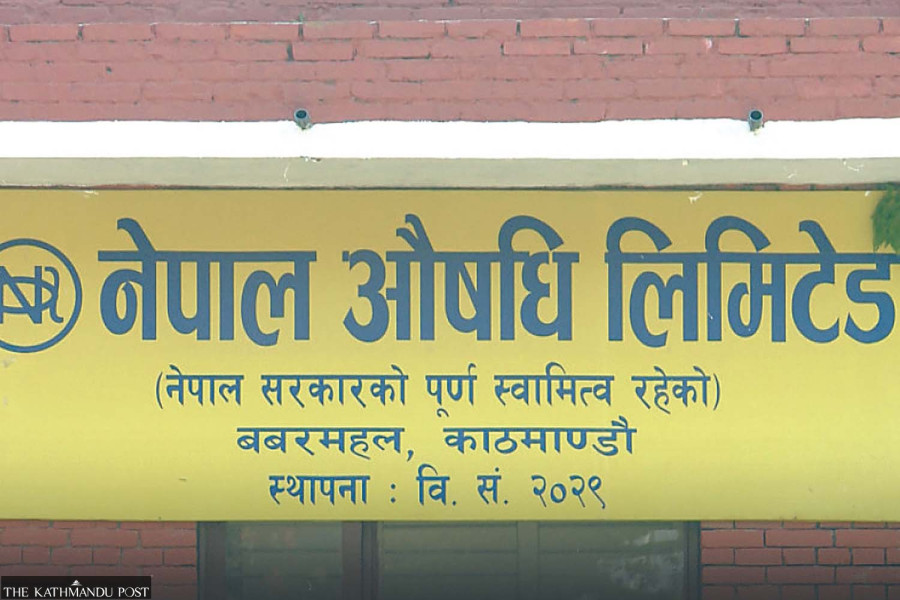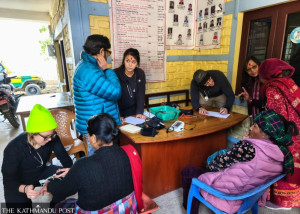Health
Kathmandu metropolis to buy essential drugs from Nepal Aushadhi Limited
The health department under the city office has asked company officials to submit a proposal for drugs that the company can manufacture and supply in the current fiscal year.
Post Report
In a bid to ensure the quality and availability of essential drugs at its urban health promotion centres, the Kathmandu Metropolitan City has decided to purchase essential drugs from Nepal Aushadhi Limited.
Officials say the metropolis’s move will help the state-run drug manufacturing company sell its products and purchase quality medicines at reasonable prices.
“This is a win-win deal. We will purchase medicines in bulk directly from the company, which helps it manufacture drugs, without fear of the sale of the products,” said Deepak Kumar KC, chief of the health department of the metropolis. “We hope that other local units will also purchase medicines from the struggling company and help give it a new lease of life.”
Established some 60 years ago with technical assistance from the British government, Nepal Aushadhi Limited was once a renowned pharmaceutical company. It used to produce over 100 essential medicines; now it produces only 11 medicines.
Officials at the KMC said that the city office will purchase the essential medicines manufactured by the company and procure them from other companies. They hoped that the purchase of medicines in bulk would help the company manufacture additional medicines for the free essential drug lists.
“Our municipal assembly meeting has decided to purchase essential medicines from Nepal Aushadhi Limited,” said KC. “We have asked the company to furnish the proposal for the drugs to sell us.”
Metropolis officials say that if a company manufactures all 98 types of medicines under the free essential drug list, they will purchase them directly from the company as per the need. The city office has allocated Rs40 million to buy free essential drugs for patients seeking care at KMC’s urban health promotion centres.
The government provides more than 98 types of medicines for communicable and non-communicable diseases from all district hospitals. Patients get more than 98 types of essential medicines from primary health care centres and health posts.
For the purchase of the essential drugs distributed free of cost, the Health Ministry provides a conditional grant to all 753 local governments. Some local units allocate budgets from their own resources to procure additional medicines and distribute them for free.
However, the availability of essential drugs has always been an issue.
Health officials say production of essential drugs by the government agency will help control the market price of medicines. They say that the government can purchase more medicines from the limited budget allocated for the programme. “Problems of drug shortages will be addressed if we could buy more medicines with the same amount of funds,” an official said.
Nepal Ausadhi Limited currently produces 11 types of medicines, including cetamol and Jeevan Jal (an oral rehydration solution), which helped health authorities ensure their supply during the coronavirus pandemic. Officials say they plan to increase the number of essential drugs produced to 20 within the ongoing fiscal year.
“We cannot produce all essential drugs immediately, but we plan to increase the number,” said Tika Ram Aryal, information officer at Nepal Aushadhi Limited.
The company’s General Manager Kailash Kumar Paneru said that he received a letter from KMC’s health department seeking a new price list for the drugs.
“For the past two years, the KMC has been purchasing medicine from our company. They purchased medicines worth Rs3.5 million two years ago and Rs1.5 million in the last fiscal year,” said Paneru. “We have also signed a memorandum of understanding with the metropolis to finance the company to produce more free essential drugs, and the company will pay back by providing medicines. But we have not yet received the budget in advance to increase our production from the city office.”
Officials at the company said that they turned to local governments after all their efforts failed to secure budgetary help from the Ministry of Industry, Commerce and Supplies and Office of the Prime Minister and Council of Ministers.
“We have also signed a memorandum of understanding with the Department of Health Services for the supply of essential medicines, but they have not procured it from us yet,” said Paneru. “During Mohan Basnet’s tenure, the Health Ministry had purchased medicines worth Rs15 million and stopped purchasing after the new minister came along.”
Health Ministry officials said that assisting the Nepal Drugs Limited in the production of essential drugs is also in the national interest, especially in view of health crises and to control the prices.




 10.12°C Kathmandu
10.12°C Kathmandu













